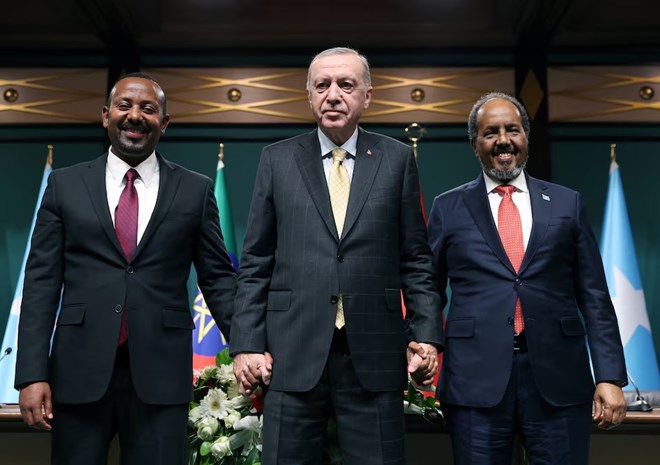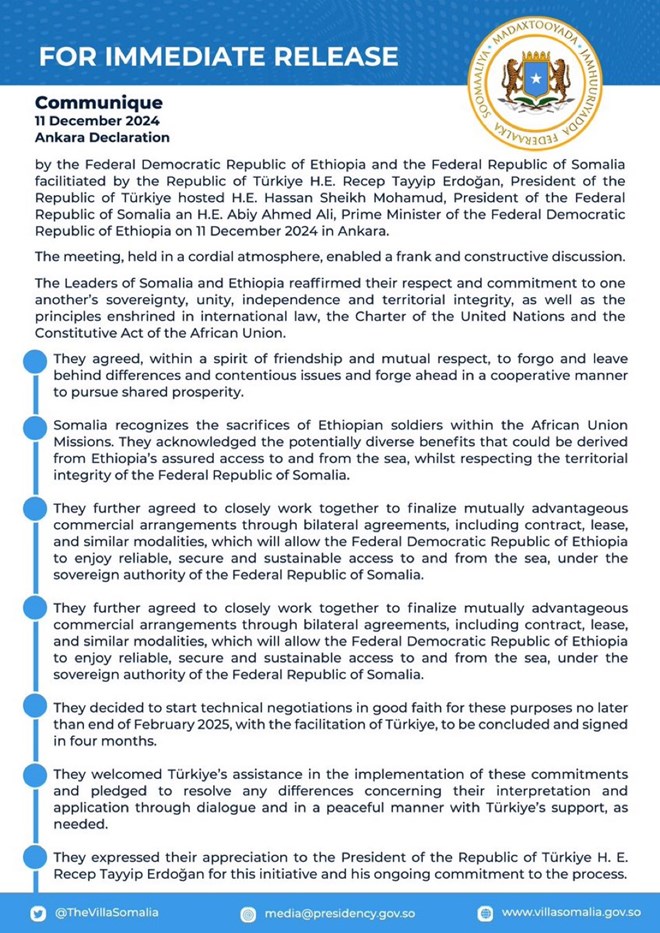
Thursday December 12, 2024
Turkish President Tayyip Erdogan poses with Somali President Hassan Sheikh Mohamud and Ethiopian Prime Minister Abiy Ahmed following a press conference in Ankara, Turkey, December 11, 2024. Murat Kula/Presidential Press Office/Handout via REUTERS
ANKARA, Turkey (HOL) — Ethiopia and Somalia have agreed to resolve a year-long diplomatic feud in a historic agreement brokered by Turkish President Recep Tayyip Erdogan on December 11, 2024. The deal, reached after marathon negotiations in Ankara, seeks to ensure Ethiopia's access to the sea while respecting Somalia's territorial integrity.
"This historic agreement is a first step towards peace and cooperation," Erdogan announced at a joint press conference with Somali President Hassan Sheikh Mohamud and Ethiopian Prime Minister Abiy Ahmed. The leaders agreed to initiate technical talks by February 2025, aiming to conclude within four months, with Turkey providing support if needed.
"This agreement is a turning point for Somalia and Ethiopia, moving us toward a future of peace and mutual benefit," Erdogan said at a press conference following the talks.
Abiy emphasized Ethiopia's peaceful intentions, calling the agreement a "positive undertaking" that would bring economic benefits to both nations. "Our aspiration for secure and reliable access to the sea is a venture that benefits not only Ethiopia but the entire Horn of Africa region," Abiy stated. President Mohamud echoed these sentiments, underscoring Somalia's readiness to work collaboratively, adding, "The Horn of Africa needs our cooperation more than ever."
The agreement comes after a year of heightened tensions following Ethiopia's controversial January memorandum of understanding (MOU) with Somaliland. The MOU proposed leasing coastal land to Ethiopia for a naval base in exchange for recognizing Somaliland's independence, which Somalia condemned as a violation of its sovereignty.
The dispute escalated with diplomatic expulsions and culminated with Somalia's pledge to exclude Ethiopian troops from the upcoming African Union Support and Stabilization Mission in Somalia (AUSSOM) unless the MOU was annulled. According to a source close to the talks, Somalia's firm stance altered Ethiopia's approach.
"By threatening to exclude Ethiopian forces from AUSSOM unless the MOU was annulled, Somalia effectively forced Ethiopia into a diplomatic pivot."
The feud also amplified regional instability, drawing in neighboring Egypt, which bolstered ties with Somalia as part of its broader rivalry with Ethiopia over the Grand Ethiopian Renaissance Dam (GERD). In August 2024, Egypt signed a security agreement with Somalia, providing military aid to counter Ethiopian influence. However, its relationship with Somalia is intricately tied to its broader rivalry with Ethiopia over the Grand Ethiopian Renaissance Dam (GERD). With Ethiopia and Somalia now seeking reconciliation, Egypt's future role in AUSSOM may face recalibration.
Meanwhile, Al-Shabaab capitalized on the uncertainty, using the crisis as a recruitment tool. The group has also intensified attacks across Somalia and raised concerns about the effectiveness of counterterrorism efforts in the region.
Abiy appeared to disavow previous comments suggesting that his nation would gain access to the sea 'by force' if necessary and emphasized the peaceful intent of his country's maritime aspirations, stating, "This venture will benefit all our neighbours and foster regional cooperation." Somali President Mohamud echoed these sentiments, calling the agreement a "halt to differences" and pledging to collaborate for mutual prosperity.
Ethiopia's pursuit of maritime access is driven by economic and political pressures, including reliance on landlocked trade routes and internal instability caused by Oromo and Amhara militant conflicts. The MOU with Somaliland, though intended to secure sea access, exacerbated Ethiopia's diplomatic isolation and drew criticism from Somalia, Egypt, as well as other regional and international actors.
Turkey, which has strengthened ties with both nations through economic and defence agreements, played a pivotal role in mediating the talks after two earlier rounds failed to yield progress.
Turkey's mediation aligns with its geopolitical interests, including recent agreements with Somalia on maritime defence and hydrocarbon exploration.
The Ankara agreement marks a major milestone in reshaping the geopolitics of the Horn of Africa. While the deal offers a pathway toward stability and cooperation, lingering questions remain about its implementation and long-term implications.
